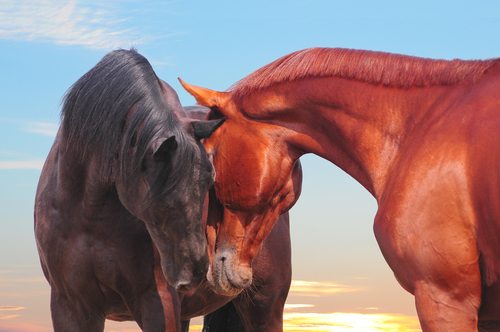Humans and horses communicate in a unique way. A new study conducted on the facial expressions of horses could explain at least part of the connection humans have with them, and possibly also explain how horses could help in the treatment of addiction, depression, anxiety, PTSD and more.
University of Sussex researchers studied the facial movements in horses and created a directory of facial expressions, which can be used in future studies aimed at better understanding how horses think and feel. The study found that horses use facial muscles similarly to humans. The researchers were able to identify 17 individual facial movements in horses — which compares with 27 in humans — and is more than has been tallied for chimps or dogs.
Equine Assisted Psychotherapy
What is Equine Assisted Psychotherapy (EAP)? EAP is pairing an individual with a horse under the guidance of a mental health professional and usually accompanied by an equine specialist. The individual would then be led through a series of activities with the horse, that are designed to address the issues that the client is working through. For instance, say the individual struggles with anxiety and trust issues, witnessing the horse overcoming it’s own fear in order to perform a task with the individual, the interaction can help the individual put their own fear into perspective.
There are a few different EAP models in the U.S. The leading international organization for EAP professionals is the Equine Assisted Growth and Learning Association (EAGALA), which provides certification, education and support for EAP professionals. Since being launched in 1999, EAGALA has grown to more than 4,500 members in 50 countries. The Professional Association of Therapeutic Horsemanship International also offers an equine-facilitated mental health program that is available in about 150 locations worldwide.
How Does Equine Assisted Psychotherapy Work?
There is very little published scientific research on how effective EAP is, although most people who have been a part of it or have witnessed it will vouch for it. However, there is still uncertainty over how EAP works. One type of EAP may work better for some people than others, but there is a long way to go before this is understood.
Essentially, EAP is still experimental. But therapists believe that in some cases it can tap into emotions and painful experiences. In a way, horses speak a universal language and they are able to mirror what the individual is feeling as well as react to the individual. This provides the therapist with information. Working with a horse can quickly expose the individual’s maladaptive thought and behavior patterns.
Recovery is hard work but you don’t have to do it alone. There are many tools and resources available to you. Call The Villa to find out how we can support your goals for sober living.

